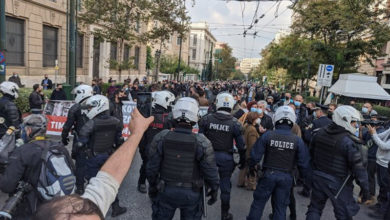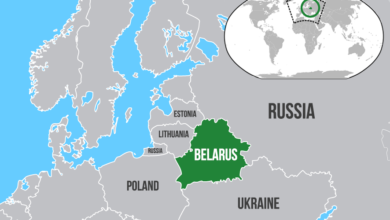In the face of yet another round of attacks on the social rights of the people of Greece, workers engaged in a general strike on May 6 and 7. May Day was officially marked on May 8 because Orthodox Easter fell on May 1 this year, making for an impressive total of three straight days of marches, rallies and the shut-down of the economy.
The strike was organized primarily by public servants union ADEDY, the private sector federation GSEE and the Communist Party’s labor affiliate PAME. The actions coincided with the debate and vote on a new package of austerity measures demanded by the Troika – the European Union, European Central Bank and International Monetary Fund – that has had a stranglehold on Greek society since 2010.
The new package of measures includes rollbacks on pensions and regressive tax reforms. Supplemental pensions were cut and the threshold for taxable income was lowered, although to preserve what’s left of its progressive image the government also included tax hikes on the wealthy and stockholders. Farmers and professionals would be hit by a massive increase in their social security contributions, and had led some of the most militant actions in the weeks leading up to the vote.
The austerity package was narrowly approved by all 153 members of the governing coalition (out of a total of 300 members of parliament), composed of the so-called Coalition of the Radical Left (SYRIZA) and the right-wing nationalist Independent Greeks party.
Outside the vote, riot police attacked the thousands of demonstrators who had gathered in front of the parliament to show their outrage. A member of Popular Unity, a new party formed primarily by those who split from SYRIZA when it went back on its campaign promises and agreed to a third bailout-for-austerity “memorandum”, was hit in the head with a tear gas canister and has filed a lawsuit.
Debate over debt relief
From the very beginning of the crisis, it was clear that Greece would never be able to repay its mountain of debt to the big banks. Prime Minister Alexis Tsipras argues that it was necessary to once again submit to the Troika’s demands because it will lead to negotiations with European officials on measures to ease the country’s debt burden.
The extent of this relief, however, is very much in doubt. All the major European forces agree that there will be no direct write-offs of any Greek debt.
There is, however, a significant level of disunity among top Troika officials. European Commission President Jean-Claude Juncker takes a relatively less exacting position, fearing the consequences of pushing Greece beyond the breaking point. The leading sector of the German ruling class, especially Finance Minister Wolfgang Schauble, is taking an ultra-hardline position, perhaps understanding that the project of European integration can only continue if the weaker links are pushed out.
While negotiations over debt relief, still theoretical at this point, would drag on for months or years, the Greek working class is set to continue to suffer under an austerity regime designed to ensure that the big banks get paid. If the past is any indication, fierce resistance will continue as well.
Additional austerity on the way
The bailout money promised to Greece in the memoranda with the Troika – which goes right back into the pockets of the big banks – are distributed in installments that are conditional on meeting certain fiscal targets and implementing various neo-liberal reforms. The next tranche is needed to make payments due in July, and the Greek government and Troika hope to disburse the funds following a meeting of Eurozone officials on May 24.
However, the recently passed pension cuts and tax increases will not be enough. Before the May 24 summit, the Troika is demanding that further steps towards the privatization of public assets be taken and new laws introduced regulating non-performing loans, which could lead to a wave of foreclosures.
The Troika is also demanding that a mechanism be set up to automatically slash government spending in the event that the Greek government does not maintain a large enough budget surplus. A main sticking point in the negotiations are differences over how large a surplus will be required. The IMF, less existentially bound to the “European project” than its other Troika partners, is demanding both extremely high surplus targets and extensive debt write-offs.
A vote on these new measures will be yet another test for the fragile governing coalition. Members of Parliament from a faction of SYRIZA called the Group of 53, which constitutes the left wing of the party now that the Left Platform faction has departed to from Popular Unity, may defect and further reduce the government’s razor-thin majority. Members of Independent Greeks, aware of their party’s abysmal polling numbers and tempted to jump ship to one of the new far-right formations launched in recent weeks, may make a similar move.
While it is being implemented with exceptional brutality in Greece, the austerity agenda of the ruling class exists throughout the world. The general strike in Greece is an example of the kind of organization and militancy needed to resist.






